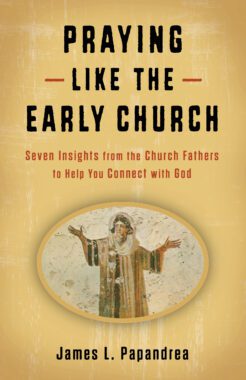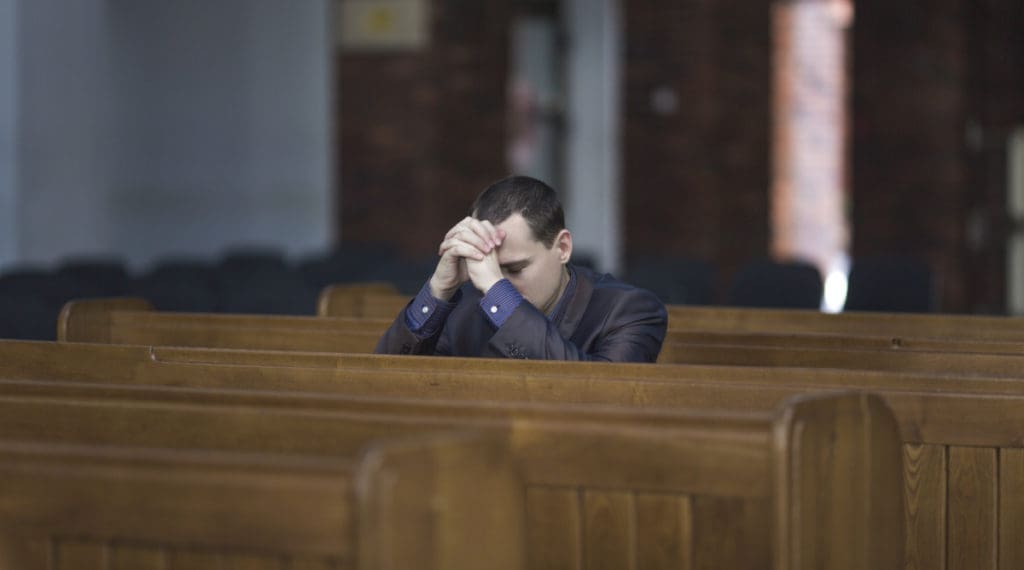What You Should Know About Prayer
As we begin our journey through the prayer lives of the earliest Christians, it’s important to understand a few things. First of all, while it is true that the first Christians met in homes, and the setting for their worship was necessarily less formal than what we might experience today in our churches, that does not mean that their worship was free-form and spontaneous. It was not what some today would refer to as “low church,” and it was not without a hierarchy of authorized leadership.
Most important, from the very beginning, the heart of Christian worship was what they called the Thanksgiving, which in Greek is the word Eucharist. In other words, the core of Christian worship was not “preaching the gospel,” in the sense of a homily or sermon. They did that, of course, though in the early Church the homily was meant to be an explanation of the Scriptures and how to live according to their expectations, so it was more catechesis than evangelization. Rather, the core of Christian worship was the proclamation of the gospel of Christ’s Passion in the Sacrament of the Eucharist. Notice how St. Paul said that every time the Eucharist is offered, we “proclaim the death of the Lord until he comes,” a line that is repeated in our liturgy to this day.
We also know that, from the beginning, only a person who was chosen and consecrated to be in the succession of bishops and priests could preside over the sacraments. Writing in the early second century, Ignatius of Antioch made it clear that no sacrament could be valid if done outside of the authority of the bishop. So it was not the case that just anyone could preside—and we’ll come back to that point a bit later. But for now, we need to be clear that, for the early Christians, prayer was something that was done when the community gathered, and it was led by someone with the authority that comes from having been taught by the leaders who came before him. The early Christians would have seen it as the ideal to gather—as the church in any given place—every day, if possible.
At the beginning, the Sacrament of the Eucharist was probably offered as a part of an evening meal, a potluck of sorts, that took place every day wherever that was possible. But it seems that by the end of the first century or so, the Sacrament had been separated from the meal, in part because of the kinds of abuses St. Paul criticizes in 1 Corinthians 11—Gentile Chris-
tians (former pagans) were treating the agape meal like a pagan banquet. Also, Roman laws against the meeting of “secret societies” forced the early Christians to move the Sacrament to the morning, before dawn—that is, before everyone went to work—and soon the Church emphasized Sunday morning as the most appropriate day of the week for the liturgy, though a
daily Eucharist would still have been seen as the ideal wherever possible.
The point of all this is that, at the beginning, the early Christians didn’t really have a concept of “personal devotion” outside of the liturgy. Jewish Christians certainly would have brought their ideas about household spirituality and mealtime prayers into the Church with them, but for the most part, Christian prayer meant being with the Church, gathered and praying together. This is why the most important prayer is the Eucharistic Prayer, which includes the calling of the Holy Spirit and the words of Jesus: the words of institution that consecrate the sacred elements to become the Body and Blood of the Lord.
What Is Prayer, and How Does It Relate to Worship?
Before we go any further, we should define what prayer is. We may think we know, but let’s make sure. It’s easy to say that prayer is talking to God, but that’s only a part of it. If we take a step back and think about our relationship with God, we remember that we are created in the image of God. And part of what that means is that we are spiritual beings, with rational souls, who are created to be in an ongoing relationship—that is, to be in constant communication—with our Creator. But this is much harder than it sounds because, while rational, our minds are also finite and very limited. We think we’re so smart, but every thought we ever have is absolutely shortsighted due to the simple fact that we cannot see the future. What that means is that we often mistake short-term (apparent) goods for long-term (ultimate) goods. Or, to put it more simply, we really do not know what’s best for us. On top of that, we are incapable of reaching out to God unless God reaches out to us first. Fortunately, He has done that through the Incarnation of His own rationality, or Logos in Greek. Or as St. John put it, the Word became flesh and lived among us (see John 1:14). That’s a game changer because now that the Divine Word has taken on our common human nature, we can really connect
with our Divine Creator in a way that was never possible before the coming of Christ. But here’s the point: prayer is not our reaching out to God. Oh, sure the Psalms are full of the prayers in which the psalmist says “I’m calling out to You, God!” But in reality, prayer can only respond to a God who has already reached out to us and continues to do so. In other words, prayer is being receptive to the ways in which God is reaching out to us.
Ultimately, prayer is meant to be more passive than active. It is a receptivity to God’s self-revelation. It is welcoming the ways in which God reaches out to us and inspires us. We cannot reach out to God first, and there is no need for our self-revelation to God, since He already knows us better than we know ourselves. Because the Holy Spirit of God indwells us, prayer is a Spirit-to-spirit meeting in which we grow in the experience of God’s presence. So prayer is not a work that we do, per se—though the discipline of making time for prayer and giving it our attention is one of the duties of every Christian; prayer is (or results in) the work that God does in us, if we are open and receptive to it. God is the one who is truly active in our prayers, and He does a lot: communicating grace, inspiring, forming our consciences, convicting us of sin, and healing us. But because God is love, and love does not coerce, God waits for us to open ourselves to Him in prayer; in effect, we have to say yes to God—just as Mary did, when she said, “May it be done to me according to your word” (Luke 1:38). We refer to this as Mary’s fiat because the Latin word fiat means “let it be done,” with the implication of: God, let Your will be done in me. And that is what prayer really is, as we will see.
For all of these reasons, prayer cannot be reduced to the speaking of words, much less to concepts such as “petition” (asking for things). Since human language is both limited and limiting (our very thought processes are confined, based on various factors, such as culture, language, education, and even mental capacity), language fails to adequately express the most important things in the universe—and yet that’s exactly what prayer is all about—the most important things in the universe. We will cover all of these ideas more completely in the chapters to come, but for now, just keep in mind that our job is to make the time and give God the permission to do the work of prayer, and to be open to increasing union with Him.
+

This article on ‘God Knows Our Hearts, But We Should Still Make Time for Prayer’ is adapted from the book Praying Like the Early Church by James Papandrea which is available from Sophia Institute Press.
Art for this post on a reflection from “Praying Like the Early Church” by James Papandrea; cover used with permission; Photo by Depositphotos used in accordance with Fair Use practices.





